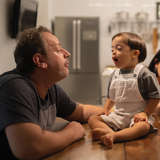Refine Search
Viewing 151-160 of 331
Keeping Lucy's family together
After Lucy escaped sex trafficking, violence, and addiction, Safe Families for Children volunteers provided a safe, temporary home for Lucy’s children so she could get the help she needed to heal.
PlayLoving a child will change your life
When considering adoption, prospective parents may be looking (consciously or unconsciously) for a child who will “fit” their family. But waiting children in foster care need families who will make room for them and welcome them as they are.
Is my open adoption safe?
Adoptive parents may wonder if it’s safe for their child to have an open relationship with birth parents who have a history of substance use. These questions and tips will help you set boundaries and adjust expectations.
A veteran who served in Afghanistan now helps Afghan refugees resettle
For some families resettling in the U.S., this is the first time they’ve ever felt safe. Every one of us can do something to provide refugees with a warm welcome.
Helping an Ethiopian orphan find a home
When Ethiopian police found young Ajani abandoned, Bethany supporters stepped in to help Maaza adopt him into her home.
Caring Connection grant supports Peyton’s medical needs
When Peyton was born, his adoptive parents quickly learned they would need to alter their financial plans to provide for his medical needs. That’s when Bethany donors stepped in.
I was so eager for a family
After waiting seven years to be adopted, Mallory was 14 when she finally found a family of her own. Her story gives a voice to other waiting teens who need a family.
Falling in love with Mallory
When Lisa Marie decided to adopt a teenager through foster care, she realized there was no guide for how to fall in love with her daughter.
To the strangers caring for my children
After Lucy escaped sex trafficking, violence, and addiction, Safe Families for Children volunteers provided a safe, temporary home for Lucy’s children so she could get the help she needed to heal.
3 tips for parenting teens from hard places
Teens with a trauma history may be protecting themselves when they keep foster and adoptive parents at a distance. Try these tips to make a lasting connection.










